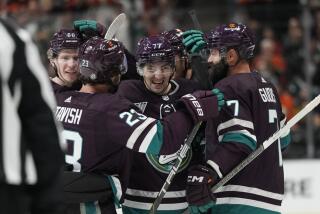Holan Has Lofty Goals in Mind
- Share via
If everybody else wants to think Milos Holan has already won, that by the very fact that Holan is on hockey skates and joining in the festivities of the Mighty Duck training camp, that this means he has accomplished some magical, miraculous achievement, well, hey, that’s fine. But that’s not why Holan is here.
This story could be tragic, and believe Holan when he says that many times he thought his story might be.
Holan’s doctor, Stephen Forman, says all bone marrow transplant survivors “represent a save, but Milos is a big save.”
Forman doesn’t even know hockey and there it was, a hockey phrase. Big save.
When Holan spent nearly eight months in the hospital, when his immune system was purposely destroyed, when his bone marrow was replaced with that of a stranger, when he was vomiting and feverish and delirious, when he could not lift his head from the pillow, when he lost nearly 50 pounds and couldn’t raise a finger or hug his pregnant wife or even see his 5-year-old daughter, yes, Holan was without hope on some of these days. Holan didn’t believe he could ever be an NHL player again. He wondered, honestly, if he would even live to see his son born.
So when Holan skated with Team A on Sunday at Disney ICE, a little tentative and wobbly legged, certainly he understood how maybe some people think he should be satisfied now. But he’s not.
“I want to make this hockey team,” Holan says simply. But it is not so simple.
For Holan has a greater purpose than just to play hockey again. Holan wants to have some other leukemia patient, some desperately ill person in an isolation room in a hospital, some person who wonders whether it is worth trying to live when each day you feel so miserable, to lift up his head and see Holan throw a hip check and knock some opposing hockey player flat on his butt.
Three years ago, when Holan, a promising young defenseman acquired by the Mighty Ducks from the Philadelphia Flyers, was diagnosed with chronic granulocytic leukemia, a particularly virulent form of the blood cancer, he stopped thinking about the future and started thinking about the next second.
All that mattered, at first, was that somewhere in the world a proper bone marrow donor would be found, for his best hope of recovery would be a bone marrow transplant. No family members were compatible and so Holan had to rely on a blind draw, as it were. He had to hope that somehow, somewhere, a stranger who had volunteered to be tested and to be listed as a bone marrow donor would be found.
And then Holan had to hope that his body could withstand the terrible beating it would take, for in order to accept the new bone marrow, Holan’s whole immune system would have to be destroyed. He had to endure months of fevers and vomiting, to accept feeling better only to be sick again with pneumonia, had to not give up when he didn’t have the strength to sit up.
“It was not a smooth recovery,” said Forman, who was in charge of Holan’s care at the City of Hope Hospital in Duarte. “It was a complex case and Milos endured complications and a long hospitalization, longer than most. It is nothing short of miraculous to go from where we were in the middle of the transplant process to where Milos is now.
“To be honest, there were many times when Milos just was hoping to be alive.”
Forman says every July the City of Hope hosts a party for bone-marrow transplant survivors. It is held outside the ward where current patients can watch.
“These patients can see what’s going on, that others like them have left the disease behind and it makes the patients want to be at that party,” Forman says. “By seeing Milos on the ice, people will see someone who’s overcome the disease. By his very activity people will see that there is life, normal life, on the other side of the transplant.”
So you want a role model? This is a role model.
Holan’s son, Milos Jr., was born during all this. The day came when Holan could leave the hospital, could go home to the Czech Republic with his wife, Irena, and his daughter, Veronica. He was able to do some scouting for the Ducks, was able to do television announcing for Czech TV when his country, improbably, won the hockey gold medal at last winter’s Olympics, was able, Holan says with a big smile and downcast eyes, to celebrate that gold medal during the serious partying that occurred.
But then, a few months ago, while Holan was looking for other players who might be good enough for the Ducks, he also did some skating. Every day the skates felt lighter, the legs felt stronger. The stick didn’t feel as if it were cast in concrete. The puck didn’t seem made of stone.
“I felt as if I could do this,” Holan says. “I came here to make the team, but if it does not happen, I did not want to think later that I had missed my chance. I am 27 now.”
There is more, though. Holan feels that making this attempt, whether it is successful or not, is for more than only himself. That’s what he told Irena, who isn’t sure she wants her husband to do this.
“She could only think about what happened before here and didn’t want me to go,” Holan said. “She’s still afraid of all the time I was in the hospital. In her mind, she’s still scared for me to be here. But when I step on the ice it is not just for me.
“It would be a big help for people like me to see me do this. I was living a year on the bed. I didn’t play now for three years. I lost 50 pounds and my legs are still not perfect. But my doctors tell me that to do this would mean so much to other people who go through the same thing. I would like to do that.”
More to Read
Go beyond the scoreboard
Get the latest on L.A.'s teams in the daily Sports Report newsletter.
You may occasionally receive promotional content from the Los Angeles Times.






